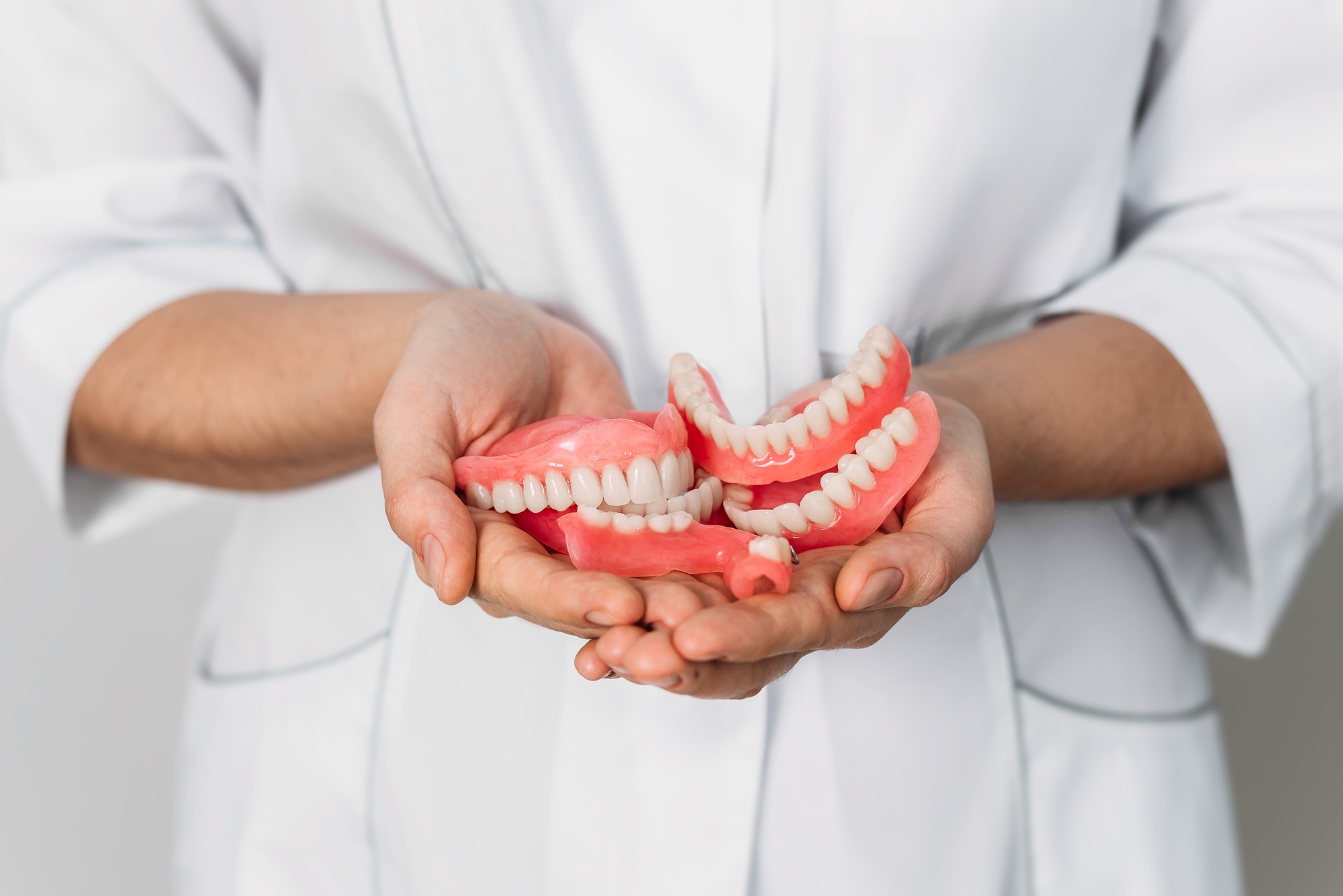Types of Full Dentures
If all of your teeth are missing or need to be removed, a full denture may be recommended. There are two main types:
1. Conventional Full Dentures
-
- All remaining teeth are extracted, and the gums are given time to fully heal (which can take several months).
-
- Once healing is complete, a custom-fitted denture is placed for optimal fit and comfort.
-
- Pro: Provides a more precise and secure fit
-
- Con: Requires a healing period without teeth
2. Immediate Full Dentures
-
- A custom denture is made in advance and placed immediately after extractions.
-
- This allows you to leave the office with a full set of teeth the same day.
-
- Pro: No time spent without teeth
-
- Con: The denture may require adjustments as the gums and jawbone heal.
If you need full dentures, we will discuss the best treatment plan based on your comfort and oral health goals.
Partial Dentures – When Only Some Teeth Are Missing
If you still have some natural teeth, a partial denture may be a better option.
-
- A partial denture consists of replacement teeth attached to a gum-colored base, held in place by metal or flexible clasps.
-
- It fills in gaps while keeping your remaining natural teeth aligned.
-
- Unlike dental bridges, partial dentures are removable for cleaning and comfort.
Benefits of Partial Dentures
-
- Prevents remaining teeth from shifting
-
- Restores chewing and speaking ability
-
- A cost-effective tooth replacement option
If you’re unsure whether a partial denture or another option like a bridge or implant is best, we’ll discuss all available treatments during your consultation.
What to Expect When Getting Dentures
Getting dentures is a multi-step process that ensures a precise, comfortable fit.
-
- Step 1: Initial Consultation
-
- We perform a dental exam and take impressions of your mouth.
-
- We discuss your goals and denture options.
Step 2: Tooth Extractions (If Needed)
-
- If teeth need to be removed, extractions are performed.
-
- If you choose immediate dentures, they will be placed on the same day.
Step 3: Custom Fitting & Adjustments
-
- Dentures are designed and fabricated to fit your mouth precisely.
-
- Multiple fittings may be needed to ensure the best fit and comfort.
Step 4: Final Placement & Follow-Up
-
- Once your dentures are ready, they are placed, and adjustments are made as needed.
-
- We provide guidance on how to care for and adapt to your new smile.
With patience and practice, dentures will begin to feel more natural over time.
Adjusting to Your Dentures – What to Expect
It’s normal for dentures to feel slightly bulky or loose at first. Your mouth needs time to adjust to eating and speaking with them.
-
- Practice speaking to get used to pronunciation changes.
-
- Start with soft foods and cut food into small pieces.
-
- Use denture adhesive if recommended for extra stability.
Most patients fully adjust to their dentures within a few weeks. If discomfort persists, we can make necessary adjustments for a better fit.
How to Care for Your Dentures
-
- Brush daily to remove plaque and food particles.
-
- Soak in a denture-cleaning solution overnight to keep them fresh.
-
- Never use hot water (it can warp the material).
-
- Handle carefully to avoid dropping and damaging them.
-
- Visit your dentist regularly for adjustments and checkups.
Proper care will help your dentures last for many years while keeping your gums and oral tissues healthy.
Schedule Your Denture Consultation in O’Fallon, MO
If you’re missing teeth, dentures can help restore your ability to eat, speak, and smile with confidence. At Brookside Family Dentistry, we create custom-fitted dentures that are comfortable, natural-looking, and built to last.
Call us today to schedule a consultation and explore your tooth replacement options!
FAQs
What are the different types of dentures?
Dentures come in full, partial, and implant-supported options. Your dentist will recommend which type is best depending on how many teeth are missing and your overall oral health.
How long does it take to get dentures?
The process usually takes several weeks and multiple appointments for impressions, fittings, and adjustments to ensure a comfortable, natural-looking result.
Will dentures feel uncomfortable at first?
It is common to experience mild soreness or increased saliva as you adjust. Most patients adapt within a few weeks as the dentures begin to feel more natural.
How do I care for my dentures?
Dentures should be removed nightly, cleaned with a denture brush and cleanser, and stored in water or denture solution. Good gum and tongue hygiene is also important.
What is the difference between dentures and implant-supported dentures?
Traditional dentures rest on the gums, while implant-supported dentures attach to dental implants for improved stability, comfort, and chewing power.


